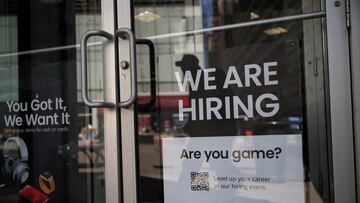Voters in Nebraska and Nevada approved ballot initiatives to increase their state’s minimum wage
Voters in these two states voted to increase their minimum wage, showing that some progressive policies are popular even in places where Democrats are not.

Republicans won big in Nebraska on Tuesday. Jim Pillen, the governor-elect, beat his Democratic opponent Carol Blood by over twenty-five points. Voters also elected three GOP congressional representatives, and down-ballot, Republicans were elected to key positions, including Lieutenant Governor and Attorney General.
Surprising to some was that in such a “red” state, voters approved a ballot initiative, Initiative 433, to increase the state’s minimum wage to $15 by a 58 to 42 percent margin.
This decision came after voters approved an increase from $7.25 to $9 an hour in 2016. Since 2015, the median income, adjusted for inflation, has increased from $69,158 to $78,109 in 2021 in Nebraska.
The increase will be implemented in a staggered way, rising to $10.50 on 1 January 2023, $12.00 in 2024, $13.50 in 2025, and reaching $15 by 2026. Unlike other minimum wage laws, after 2026, increases will occur on an annual basis, based on the CPI for the Midwest region.
Nebraska Republican Party did not believe the increase ‘aligned’ with their values
Interestingly, the Nebraska Republican Party came out against Initiative 433, saying it did not align with Republican values. Another measure approved by voters and rejected by the GOP was Initiative 427, which expanded access to Medicaid in the state. Many political experts are looking at these racing and believe it worth Democrats reflecting on these results to see how policies they embrace do not translate into wins for their candidates.
Nevada voters are on the precipice of increasing the minimum wage to $12
Currently, a ballot initiative to increase the state’s minimum wage to $12 an hour from $10.50 by 2024. The measure would also ensure that the increases applied to both workers who do and do not receive their insurance through the employers.
The Republican Party, which stands a chance of unseating Gov. Steve Sisolak (D) and Sen. Catherine Cortez Masto, opposed the measure, highlighting the popularity of progressive policies, even when some vote for GOP candidates.
Both of these races show that voters are falling less ideologically consistent than what many pundits seem to believe. Policies like Medicaid expansion, increasing the minimum wage, and marijuana decriminalization have all been approved in red states, yet voters continuously reject Democratic candidates and cast votes for Republicans that would, and do, stand in the way of these sorts of legal change.
Voters in South Dakota voted to expand Medicaid, meaning that only eleven states have not increased healthcare coverage for their poorest residents. The Urban Institute has reported that if all states were to expand the program, more than 3.7 million people would have access to health insurance; this figure is a bit lower considering results in South Dakota.
What did this mean for Democrats?
Progressive candidates in areas where Democrats have low favorability may need to make a greater effort to reach out to voters to explain the policies they support. It is clear that issues like the minimum wage, abortion rights, and drug decriminalization are favored and connected with voters because many may have more progressive views on these issues. Democrats, should they be looking to improve their positions in some of these areas, some political experts believe that the party could provide funding to these candidates, even if they do not toe the party line on all issues.
With Florida and Texas showing that they are not likely to become Democratic strongholds, the Democrats must look inward to states they have written off as “deep red.”






